|
Dear Friends of HKSI, It has been an extraordinarily busy start of a term. Please check out our forthcoming November events and join us if you can. Leo K. Shin 單國鉞 |
|
||
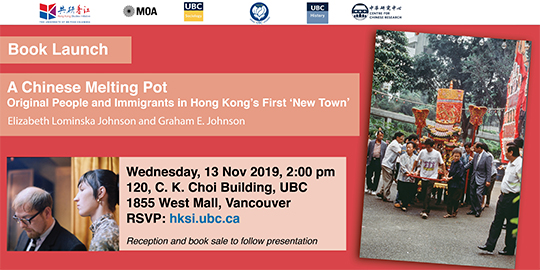 |
||
|
Book Launch Reception and book sale to follow presentations Drawing on research in anthropology and sociology conducted over the past fifty years, as well as lived experience, Elizabeth and Graham Johnson have produced a study of the mid-twentieth century transformation of a rural district in Hong Kong’s New Territories into a chaotic industrial city. Conditions deteriorated to the point that the colonial government had to abandon its laissez-faire policy and designate it the first 'new town' on the British town planning model. By the 1980s, dramatic change on both sides of the border resulted in its development into a post-industrial city. Their work has implications beyond its specific location: scholars of history, anthropology and sociology, urban planning, ethnomusicology, women’s studies, political science, ethnic relations, and China studies in general will find it meaningful—and the authors hope that it may help to provide insight into the unforeseen challenges facing contemporary Hong Kong. Tsuen Wan was incorporated into Hong Kong’s New Territories in 1898. The original inhabitants were Hakka, and settled the area in the 18th century. They were guaranteed land rights, which were central to later developments, by the colonial government. After the Japanese war, the town was overwhelmed by vast numbers of immigrants fleeing war and revolution and seeking employment in rapidly-developing industries established by immigrant Shanghai entrepreneurs. The newcomers were welcomed as tenants, but in the absence of firm planning guidelines, their numbers far exceeded the town’s ability to house them. The original inhabitants were firmly rooted in villages and elaborate kinship organizations; the immigrants similarly relied on voluntary associations to help them face the many challenges that change brought into their lives. Over time, and especially under Governor MacLehose, the government became more interventionist and developed Tsuen Wan as the first ‘new town’ in the New Territories. In recent years, the culture of the original inhabitants has become diluted and differences among immigrants have diminished as all have assumed a general Hong Kong identity. The authors began studying Tsuen Wan while earning their PhDs at Cornell University. Both spent their professional careers at the University of British Columbia. Elizabeth Lominska Johnson was curator at the Museum of Anthropology, while Graham E. Johnson was professor of sociology. This event is co-hosted by: Hong Kong Studies Initiative, Museum of Anthropology, Department of Sociology, Department of Asian Studies, Department of History, and Centre for Chinese Research. |
||
|
|
||
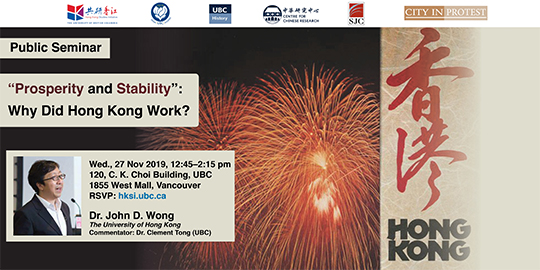 |
||
|
Public Seminar Free and open to the public The current crisis in Hong Kong is characterized by a level of social unrest the city has not seen since the riots of 1967. In the aftermath of the previous round of turmoil, the British colonial regime regained legitimacy of its rule largely through the socioeconomic improvement of Hong Kong. “Prosperity and Stability” became the hallmark of Hong Kong’s success that extended beyond the 1970s into the period of political uncertainty in the 1980s. Socioeconomic development in the post-handover era stands in sharp contrast to the economic miracle of post-riot Hong Kong in the 1970s and 1980s. Post-handover Hong Kong has registered lackluster economic growth in most years, and growing income inequality is only exacerbating the situation for the average Hongkonger. Examining the current crisis beyond the protestors’ political demands, this talk explores how socioeconomic forces might have animated differently the various demographic groups in Hong Kong and questions whether political reforms alone could put an end to the conflicts in the city. Dr. John D. Wong received his BA (Hons) in Economics from the University of Chicago, MBA from Stanford University, and PhD in History from Harvard University. He has taught at the University of Hong Kong since 2012. His research focuses on the flow of people, goods, capital, and ideas. With a particular interest in Hong Kong and the Pearl River Delta area, Dr. Wong explores how such flow connected the region and its residents to the Chinese political center in the north as well as their maritime partners in the South China Sea and beyond. Studying the China trade in the context of early-nineteenth-century global exchange, his first monograph, Global Trade in the Nineteenth Century: The House of Houqua and the Canton System (Cambridge University Press, 2016), demonstrates how China trade partners sustained their economic exchange on a global scale long before Western imperialism ushered in the era of globalization in a Eurocentric modern world. He has published in various academic journals including Business History Review, Law & Literature, and Asia Major. This seminar is organized by the Hong Kong Studies Initiative and co-sponsored by: Department of Asian Studies, Department of History, Centre for Chinese Research, and St. John's College. |
||
|
|
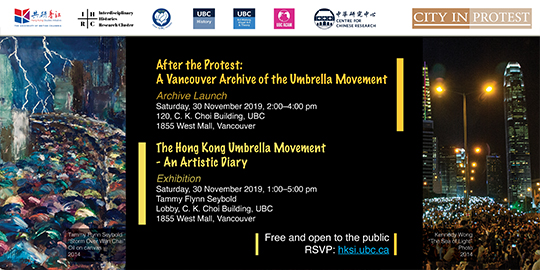 |
|
|
Join us for this special two-part event to mark the public presentation of “After the Protest: A Vancouver Archive of the Umbrella Movement.” Archive Launch Free and open to the public RSVP: https://hksi.ubc.ca/events/event/launch-vancouver-archive/ The 79-day Umbrella Movement of 2014—which in many ways foreshadowed the current struggles of Hong Kong—was a watershed moment in the history of the city. Not only has the protest movement transformed the political and social dynamics of this former British colony, it has also deeply affected overseas Hong Kong/Chinese communities. Our goal for this project is to create a publicly accessible oral history archive, both as a means to learn about the impacts of the Umbrella Movement in general but also as a way to better understand the Hong Kong community in Vancouver in particular. |
|
|
Exhibition Free and open to the public (registration not required for the exhibition) During the 2014 pro-democracy protests in Hong Kong, many creatives put forth their art to document and support the movement. Near the “Lennon Wall” in Admiralty, sculpture, paintings, video art installations and more grew organically into a large and inclusive exhibition of protest art. Tammy Flynn Seybold was an artist living and working in Hong Kong during this time, and she began creating a documentary artwork for each day the streets were occupied. Her artwork was informed by the local media reports and her photography, taken at the Central, Admiralty and Wan Chai protest sites. Copies of the paintings and illustrations hung at the Admiralty protest site, but the originals travelled with Flynn Seybold when she moved to Vancouver in 2015. These are being exhibited for the first time, alongside the more recent work of UBC student Aaron Tong, whose piece also addresses this critical time in the history of Hong Kong. Since her undergraduate studies of Art, History of Art, and Chemistry at the University of California, Berkeley, Tammy Flynn Seybold (and her work) has been influenced by her belief in the power of art to inspire and influence change. Her graduate work at Queen’s University, where she received her Masters in Art Conservation, cemented her conviction to preserve cultural works and heritage. The paintings, illustrations, and photography she created in the autumn of 2014 were an effort to document, highlight, and propagate the truth of what was occurring in the streets of Hong Kong during this critical time. Flynn Seybold’s artwork has been exhibited in Toronto, Hong Kong, and Vancouver. Her latest exhibition, “Of Time and Tides,” recently held at the Silk Purse Art Centre in West Vancouver, documented what is gifted to us by the Pacific Ocean, both in Hong Kong and here in Vancouver. This special two-part event is organised by the Hong Kong Studies Initiative and is generously sponsored by the Interdisciplinary Histories Research Cluster, Department of Asian Studies, Department of History, Department of Art History, Visual Art & Theory, Asian Canadian Asian Migration Program, and Centre for Chinese Research. |
|
|
||
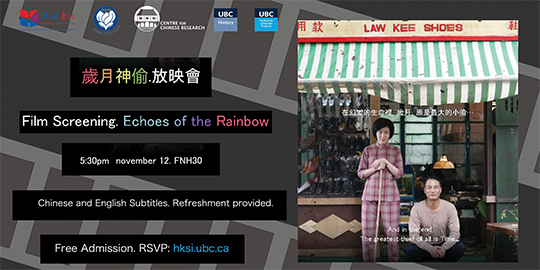 |
||
|
Tuesday, 12 November 2019, 5:30 pm Chinese and English subtitles RSVP: https://hksi.ubc.ca/events/event/screening-echoes-of-the-rainbow/ “The ups and downs of a Hong Kong family and their shoe shop as seen through the eyes of their eccentric eight-year-old son.” Need a study break? Come join students of HKSI for a free screening of this heart-warming, award-winning film by director Alex Law. This social event is organized by the Hong Kong Studies Initiative and co-hosted by the Cantonese Language Program, Department of Asian Studies, Department of History, and Centre for Chinese Research. |
|
||
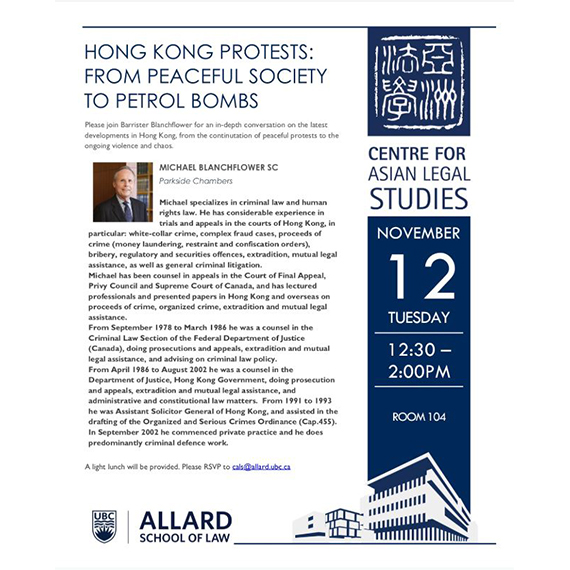 |
||
|
CALS Talk Light lunch will be provided Please join Barrister Michael Blanchflower for an in-depth conversation on the latest developments in Hong Kong, from the continuation of peaceful protests to the ongoing violence and chaos. Michael specializes in criminal law and human rights law. He has considerable experience in trials and appeals in the courts of Hong Kong, in particular: white-collar crime, complex fraud cases, proceeds of crime (money laundering, restraint and confiscation orders), bribery, regulatory and securities offences, extradition, mutual legal assistance, as well as general criminal litigation. Michael has been counsel in appeals in the Court of Final Appeal, Privy Council and Supreme Court of Canada, and has lectured professionals and presented papers in Hong Kong and overseas on proceeds of crime, organized crime, extradition and mutual legal assistance. From September 1978 to March 1986 he was a counsel in the Criminal Law Section of the Federal Department of Justice (Canada), doing prosecutions and appeals, extradition and mutual legal assistance, and advising on criminal law policy. From April 1986 to August 2002 he was a counsel in the Department of Justice, Hong Kong Government, doing prosecution and appeals, extradition and mutual legal assistance, and administrative and constitutional law matters. From 1991 to 1993 he was Assistant Solicitor General of Hong Kong, and assisted in the drafting of the Organized and Serious Crimes Ordinance (Cap.455). In September 2002 he commenced private practice and he does predominantly criminal defence work. |
||
|
||
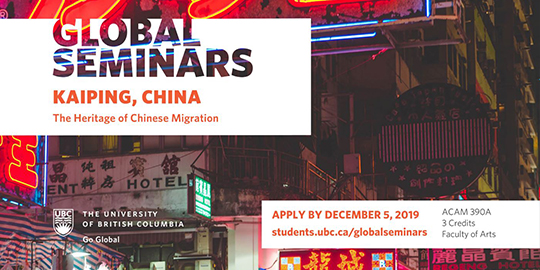 |
||
|
2020 Summer GoGlobal Seminar This unique field study in Vancouver, Hong Kong, Kaiping, Singapore, and Malaysia will allow students to explore multi-disciplinary perspectives on the histories, cultures, and geographies of Cantonese migration. These migration networks primarily stemmed from the “Szeyup,” or “Four Counties,” area of the province of Guangdong (Canton), the home region of many overseas Chinese who went to Canada in the 19th and 20th centuries. Led by Professor Henry Yu (History), this is an ideal opportunity for students looking for a short yet rewarding exchange experience. Graduating students and/or non-Arts students are also encouraged to apply. Application deadline: 5 December 2019 Information Session: |
||
|
||
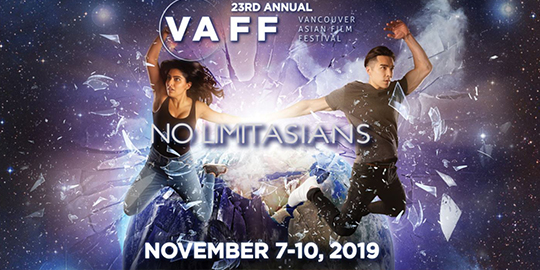 |
||
|
7–10 November 2019 Details: http://vaff.org/
|
||
 |
|
Exhibition Details: https://www.facebook.com/events/1441026162727842/ Public forum:https://www.eventbrite.ca/e/public-forum-hong-kong-now-what-tickets-79082033491 |
|
||
|
October 4: Dr. Kenny K. K. Ng of the Hong Kong Baptist University presided over a fascinating seminar on the borderscapes and cinematic expression in Cold War Hong Kong. October 24: Prof. Laikwan Pang of the Chinese University of Hong Kong explored the global meanings of Hong Kong's democratic project in front of an enraptured UBC audience (photos). October 25: Artists from Hong Kong-based ZINE COOP were joined by Prof. Laikwan Pang for a Cantonese-language salon at Centre A on the impacts of “zines” as vehicles for marginalized voices (photos). |
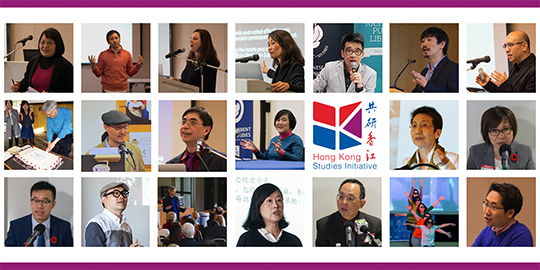 |
|
Please kindly consider a tax-deductible donation to HKSI (hksi.ubc.ca/support-us). Thank you, as always, for your support of the UBC Hong Kong Studies Initiative. |
|
||||
| This email is intended for lshin67@gmail.com. Unsubscribe |
